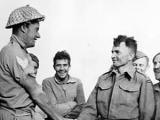What happened that day?
See historic events for any day of the year by entering the date below. Why not try your birthday?
Kiwi of the Week
Today in History

1945 Upham presented with VC
New Zealand’s most-decorated soldier was recognised for his outstanding gallantry and leadership in Crete in 1941 and Egypt in 1942. He remains the only combat soldier to have been awarded a Bar to his Victoria Cross − the highest decoration for valour ‘in the face of the enemy’ for which members of the New Zealand armed forces are eligible. Twenty-five New Zealanders have won the VC. Another 14 were awarded to British personnel serving in the 19th-century New Zealand Wars. This conflict also resulted in 23 recipients of the New Zealand Cross, an award for those serving in colonial units that was deemed equivalent to the VC.
Christchurch-born Charles Upham, who volunteered for service at the outbreak of the Second World War, personified what many saw as the essential qualities of the New Zealand soldier. He developed these qualities as a musterer in the Canterbury high country, where men had ‘to match the ruggedness of nature with their own ruggedness of physique and temperament'. The rigours of the kind of rural life experienced by Upham were seen as the secret of New Zealanders’ success in battle.
Upham was fiercely loyal to his comrades and shunned the limelight. When informed of his first VC he was genuinely distressed at being singled out. He believed that others deserved it more than he did. Only by seeing it as recognition of the bravery and service of his unit could Upham accept the award and the unwanted attention that went with it.
Upham earned the VC for outstanding gallantry and leadership in Crete in May 1941, and his Bar at Ruweisat Ridge, Egypt, in July 1942. After being severely wounded in the latter engagement, Upham was captured by the Germans. Having failed in an attempt to escape from an Italian hospital, he was transferred to Germany in September 1943. A particularly audacious solo effort to scale his camp’s barbed-wire fences in broad daylight saw Upham become the only New Zealand combatant officer sent to the infamous Colditz camp for habitual escapers in 1944.
When the recommendation was made for a second VC in 1945, King George VI told Major-General Howard Kippenberger that a Bar to the cross would be ‘very unusual indeed’. When the King asked, ‘Does he deserve it?’, Kippenberger replied, ‘In my respectful opinion, sir, Upham won the VC several times over’. Upham was presented with his VC at Buckingham Palace on 11 May 1945, a few days after the end of the war in Europe.




















